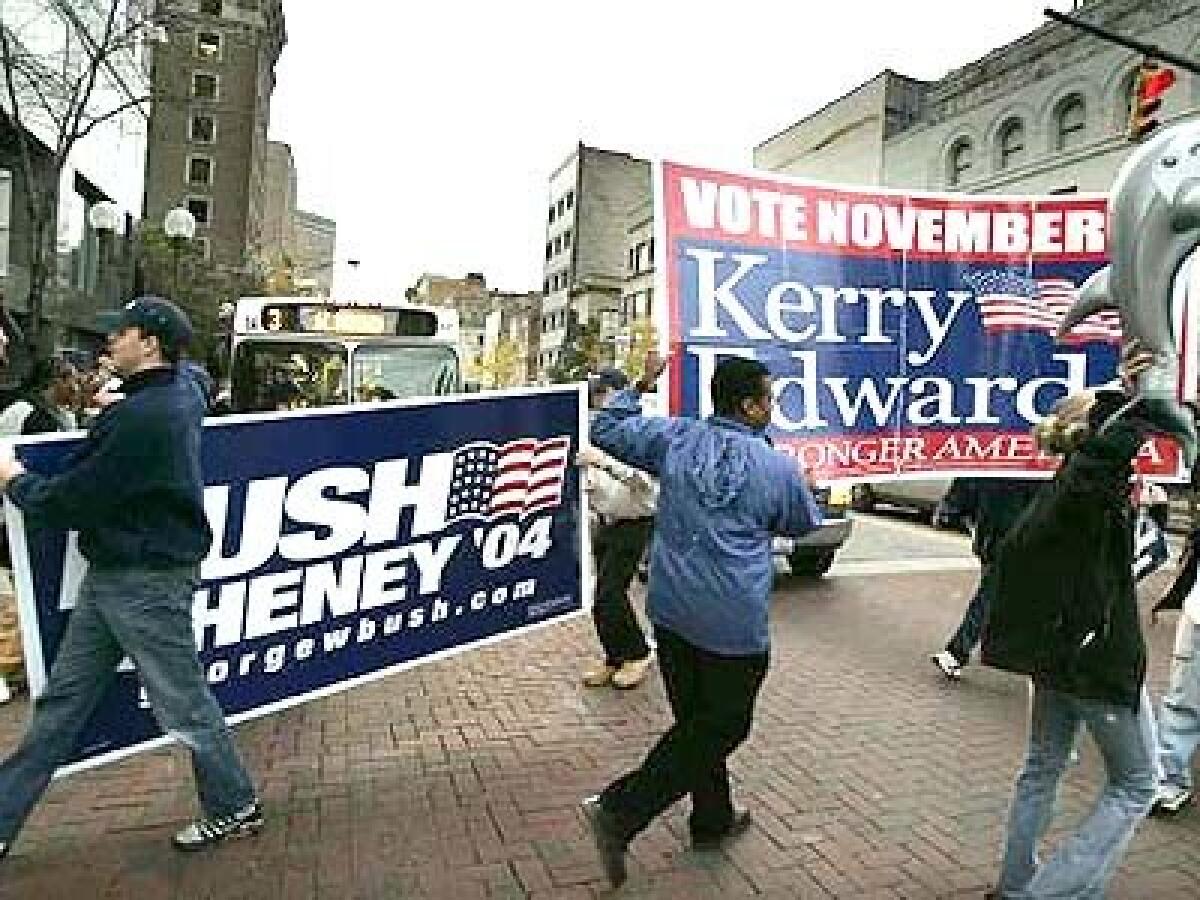Few Problems Reported as Polls Are Closely Watched

Voters crammed into polls across the country today and despite some early concerns, few major problems were reported as the 2004 national election appeared headed to a record turnout.
Hundreds of thousands of volunteers, professional organizers and lawyers fanned out across the United States today to witness the presidential election and to make sure millions of people vote without problems.
“Generally, the day could be characterized as no bigs, but lots of littles,” said Doug Chapin, director of the Election Reform Information Project, a nonpartisan research group.
There were problems with machines not working in New Orleans, with ballot coding for a congressional race in suburban Richmond, Va., but those were resolved, Chapin said.
By early afternoon Pacific time, partisan challengers had not affected voting in Ohio, as some had feared they would, but Chapin said that could change as a result of an appeals court decision.
Although the voting problems were fewer than feared, Chapin said, “We’re only halfway through the day in some parts of the country.”
The advocacy group Common Cause and other organizations set up a voter telephone line for information or complaints and said that more than 130,000 calls had been registered by midafternoon, 50,000 of them since 6 a.m.
In Palm Beach County, where Florida’s electoral catastrophe of 2000 had begun within minutes of the polls opening, throngs of voters cast ballots without major problems. Since the last presidential contest, the punch card system and butterfly ballot that sparked so much confusion and controversy in Florida’s biggest county four years ago had been supplanted by computer touch screens, which many voters said they found a breeze to use.
“It was smooth like silk. You just pressed a choice with your finger,” said Rita Gold, a Delray Beach retiree, who voted during the morning at Temple Emeth synagogue with her husband Lee, a Korean war veteran. Both husband and wife, who moved to Florida seven years ago from the Northeast, said they voted against President Bush; she for Sen. John F. Kerry, he for Ralph Nader.
Sara Goodwin, a former teacher who lives in Palm Beach, waited a half-hour at lunchtime to cast her ballot. The 51-year-old declined to say who she voted for, but expressed hope that after a long and polarizing campaign, Americans will come together as soon as the votes are counted and a winner is declared.
“Every tax-paying citizen just wants the election to be held fairly and honestly and get on with the business of this country,” Goodwin said. “God knows we have issues to address: Social Security, good schools. We just want the show to move on. We need our problems to be addressed by whoever wins the election.”
Memories of election day 2000, when the results took until December to sort out, fueled some of today’s concern.
Four years ago, the Supreme Court intervened in a recount after 36 days, preserving George W. Bush’s 537-vote victory over Al Gore in Florida and with it the presidency.
In Ohio, a divided federal court of appeals handed Republicans a potentially significant victory just hours before the polls opened today, clearing the way for the party to challenge thousands of newly registered voters.
Justice John Paul Stevens, who handles appeals from Ohio, declined a request for a stay.
In Philadelphia, Republican activists claimed voting machines already had thousands of votes recorded on them when polls opened. But city officials said the activists misunderstood machines that record every vote ever cast — not just those for this election.
Among the reports were those from people who had requested but did not receive absentee ballots and were trying to vote in person but being challenged or told to use provisional ballots.
Chellie Pingree, the president of Common Cause, said the election system “was not prepared to handle so many voters,” and people are dealing with inefficient machines, insufficiently trained poll workers and lines as long as two three hours, among other problems.
She said in a telephone news conference that provisional ballots could “be the hanging chad of this election.”
“The discretion that’s given to poll challengers and those who will count provisional ballots — that’s the wild card of this election,” said Spencer Overton, a law professor at George Washington University.
The decision in Ohio by the U.S. 6th Circuit Court of Appeals could affect at least 23,000 newly registered Ohio residents whose qualifications Republicans have sought to challenge. The ruling upheld Ohio’s law on voter challenges.
Republican Party officials have recruited about 3,500 challengers, many of them lawyers, to go to polling places around the state and question the validity of new voter registrations, particularly in heavily Democratic regions.
But the Republican challengers were keeping a low profile, watching more than intervening, according to press reports from the region.
On Monday, two federal district judges, one a Democratic appointee and one a Republican, had barred Republicans from challenging voters, saying that could cause chaos at the polls that would deny people the right to vote.
The 2-1 appeals court majority disagreed, saying the possibility of longer lines “does not amount to the severe burden upon the right to vote” that would justify a court order, Judge John M. Rogers wrote for the court.
Rogers, a Bush appointee, was joined by Senior Judge James L. Ryan, an appointee of President Reagan. Appeals Court Judge R. Guy Cole Jr., a 1995 appointee of President Clinton, dissented.
Under Ohio law, a person may challenge a voter by alleging that he or she is not a U.S. citizen, is not old enough to vote or has not lived in the county for 30 days. Voters who are successfully challenged have the right under federal law to cast a provisional ballot, but those would not be counted on election day.
Each party has accused the other of other mischief, too.
In Lansing, Mich., some voters received calls falsely claiming that Kerry would legalize gay marriage. In New Jersey, Republicans complained that households were getting phone calls claiming an endorsement of Kerry by retired Gen. Norman Schwarzkopf. Schwarzkopf supports Bush.
A poll by the National Annenberg Election Survey found 62% of registered voters were “very confident” their votes would be accurately counted. An additional 22% said they were “somewhat confident.”
Times staff writers Mary MacVean, Michael Muskal and John Glionna contributed to this report, as did Associated Press.
More to Read
Get the L.A. Times Politics newsletter
Deeply reported insights into legislation, politics and policy from Sacramento, Washington and beyond. In your inbox three times per week.
You may occasionally receive promotional content from the Los Angeles Times.










